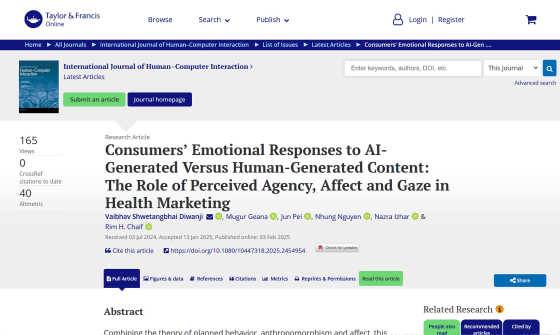Research reveals that people prefer to talk to AI when they are embarrassed, but prefer to talk to other people when they are angry

In recent years, there have been an increasing number of cases where AI chatbots are used instead of humans for customer support, in-house technical support, etc. In an experiment conducted by a research team at the University of Kansas in the United States, it was found that humans prefer AI chatbots when dealing with embarrassing issues, but when they feel angry, they prefer to interact with humans.
Consumers' Emotional Responses to AI-Generated Versus Human-Generated Content: The Role of Perceived Agency, Affect and Gaze in Health Marketing: International Journal of Human–Computer Interaction: Vol 0, No 0 - Get Access

Study finds people prefer AI chatbots when discussing embarrassing health info — but humans when they are angry | KU News
https://news.ku.edu/news/article/study-finds-people-prefer-ai-chatbots-when-discussing-embarrassing-health-info-but-humans-when-they-are-angry
During the COVID-19 pandemic, a flood of information about vaccines, social distancing and a variety of other topics has evoked feelings of anger and embarrassment.
For example, political division, social pressures such as mandatory vaccination, disruptions to daily life, and doubts about the safety and effectiveness of vaccines have made some people feel anger. Others have felt embarrassment due to their own lack of knowledge or believing false information, the discomfort of being the only one who has not been vaccinated while others have, or the awkwardness of declaring their vaccination status.
This time, a research team at the University of Kansas conducted an experiment in which subjects were shown videos that made them feel angry or embarrassed, and then had them discuss vaccines with AI or humans. Vaibhav Diwanji , assistant professor of journalism and communication and lead author of the paper, said, 'I'm interested in how information provided by AI or humans influences people's decision-making. I thought the COVID-19 pandemic was an ideal time to think about this problem. Unfortunately, the pandemic has become very politicized, and there has been a lot of misinformation and disinformation circulating. People also tend to feel angry and embarrassed about this topic.'

The study involved 100 participants who were asked about their attitudes towards COVID-19 vaccination and booster shots, and then shown either an anger-evoking video featuring domestic violence, an embarrassment-evoking video featuring erotic scenes, or a neutral video featuring nature.
'Eye tracking technology is a great way to track people's emotions without explicitly asking them, especially when they might not be able to verbally express how they're feeling,' says Diwanji.
Participants were then randomly assigned to speak to either Diwanji's AI chatbot or a human researcher about COVID-19 vaccine information. Finally, participants answered the question: 'Would you rather use an AI or a human for information about vaccines?'

The results showed that subjects who felt embarrassed by the video preferred the AI chatbot over a human, while subjects who felt angry preferred a human. The findings suggest that both AI and humans have advantages, and that tailoring your approach based on the subject's emotions can be effective.
'AI chatbots are perceived to be free of bias, and people say they prefer chatbots when they feel embarrassed,' said Diwanji. 'In an increasingly digital and emotion-aware world, researchers and marketers need to blend technology with emotional insights. The ability to understand, respond to and leverage emotions such as anger and embarrassment will not only improve consumer satisfaction, but also create more human experiences that build long-term relationships with consumers.'
Related Posts:
in Software, Web Service, Science, Posted by log1h_ik







